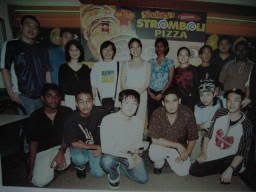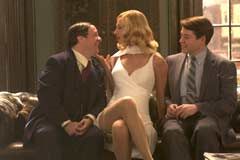SWAN SONG for Malay Mail's At The Movies
WE have come to the final instalment of this weekly movie review column which had run in The Malay Mail for almost 30 years. For this week, I would like to do an overview of those years which had formed a big part of my life.
My first film review assignment was in July 1977 when I was asked by the editor to take over the job from a colleague who had quit. Working as a desk-bound sub-editor in The Malay Mail, I was more than happy to be able to write – and reviewing movies suited me fine because I had been an avid cinema-goer since my childhood days in Penang. Those were the days of Saturday morning cheap matinees that cost 50 sen and reruns at the Great World Park for 25 sen. That first review – of detective spoof Murder By Death – saw print on July 9 1977.
From then on, I was hooked, both to writing and watching movies way ahead of the public. In May 1979, the star-rating system came into being. The then editor, Chua Huck Cheng, reckoned that it would give readers an idea of what I thought of the movie at a glance. In 1981, the annual Malay Mail Readers’ Top 10 Movies Poll was launched and it caught on with our readers so much that many had made it a point to take part every year.
Of course, the project also attracted the cinema giants and Kentucky Fried Chicken who came in as sponsors for complimentary tickets and KFC snack vouchers. And like old faithfuls, they had been supporting this Annual Poll right up to last year. Way back in the late 70s and early 80s, Press screenings were held at night at the Shaw Brothers and Cathay Organisation offices in the Bukit Bintang area. Chilled beer was among the beverages served.
My most memorable movie review assignment has to be that of The Wild Geese in January 1979 when the folks of Genting Highlands flew the Press contingent up by helicopter to the resort where they dined and wined us before screening the movie in conjunction with the launch of their cineplex. We were then given a free overnight stay at their posh hotel before being flown back to KL the next day. Like they say, it was a tough job but someone had to do it.
The most trying times for this columnist were usually in the week before the Chinese New Year when the distributors rushed to get their movies out in time for the festival. This meant that we had to attend two to three screenings a day and writing about them within the week. Now, didn’t I say it was a tough job?
Contrary to what many people think, reviewing movies is not just finding fault with them. I had strived to bring out certain aspects of the production that readers tend to miss out on. For example, in M. Night Shyamalan’s Signs, many viewers had thought that it was about UFOs – instead of its theme about Faith that the protagonist (Mel Gibson) was wrestling with.
Also, I have had my share of readers who did not agree with my ratings for certain movies but I had always maintained that it was my heartfelt personal opinion. I had always appreciated feedbacks even if they were brickbats. My greatest joy as a columnist was compiling the Shakey’s Young Reviewers Column which ran from January 2000 to 2002. I had learnt a lot from these youngsters and some of them – Arivind Abraham, Davina Goh and Jason Lim – are making a local movie called S’kali which will be released soon. 
Yes, it had been a pleasure writing the column despite having to meet deadlines and structuring my life around it. The ‘new’ Malay Mail plans to boost its coverage of movies and I hope to be part of it too.Till then, my sincere gratitude to GSC, TGV Cinemas, KFC, Buena Vista Columbia Tristar Films, 20th Century Fox, UIP, Warner Bros, Regilent Sdn Bhd, and the staff and readers of The Malay Mail for their support all through the years. Check out this blog for future reviews. Goodbye and see you all At The Movies! 







